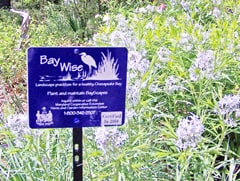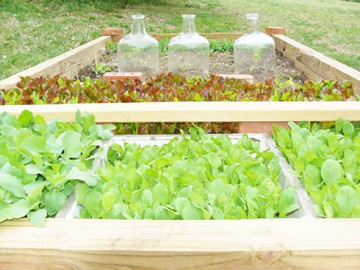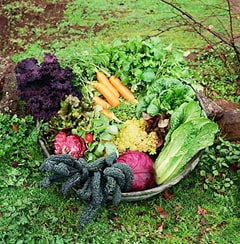Digging In
Let no one think that real gardening is a bucolic and meditative occupation. It is an insatiable passion, like everything else to which a man gives his heart.
–Karel âapek, 1931
There are gardeners — and then there are gardeners. People whose love, whose devotion to gardening runs so deep they can’t keep it to themselves. It’s more than a hobby. It’s a passion. They have to share it, teach it.
Because what they’re giving is something big: the key to rejuvenation … a way to reconnect … knowledge that makes you able to reap what you’ve sown. From digging, sowing, weeding and reaping come calm, peace and escape.
Through the Master Gardener Program, they spread the word that truth can be found in a garden, alongside the radishes.
Master gardeners understand our symbiotic relationship with our environment. Peaceful coexistence with nature is knowledge they are eager to share.
The Making of a Master
When the world wearies and society fails to satisfy, there is always the garden
–Minnie Aumonier
R.T. West loves his Huntingtown garden.
“A garden stimulates all my senses,” West says. “The smell of freshness after a light rain, the sounds of all the bugs and bees and critters, the sight of new growth and flowering plants, the feel of a velvety leaf — and the taste of the first ripe tomato fresh from the vine. I am more alive after visiting my garden.”
He shares his passion with wife Katherine. Both are master gardeners, she earning her certification in 2002, R.T. in 2005. Katherine prefers flowers, while W.T. plants mostly vegetables and trees. Their garden is a joint effort.
“We planted peas together last week,” he says.
For the Wests — and thousands of devoted gardeners like them — being a gardener isn’t enough. They want to learn about plants and the environment, and in turn they want to share their learning with others.
“Sharing knowledge is necessary to our planet’s stability and sustainability,” R.T. West says.
Which is why the Wests became master gardeners.
The Master Gardeners Program has its roots in Washington state, rising from the State University’s Cooperative Extension’s 1972 search for a way to respond to the growing demand for horticulture and gardening advice.
As gardens multiplied, so have master gardeners. Today the program has chapters in all 50 states and four Canadian provinces, with close to 100,000 certified master gardeners.
The 33-year-old Maryland Master Gardener Program, run by the University of Maryland Extension, has active programs in 18 counties, Baltimore City and two prisons.
Like a plant, master gardening is self-sowing. Its premise is the same everywhere: Give gardeners horticulture training and send them out to teach others.
As is Robin Costas of Lothian, a master gardener in Anne Arundel County since 2001.
“I didn’t know what I was getting into,” Costas tells Bay Weekly. “My friend talked me into doing it. I love to learn about plants, and I like taking classes. By the time I found out about all of the volunteer hours required, I was committed.”
Master gardening is a program for the committed. First come 40 to 50 hours of basic classroom and field training with horticultural experts, usually people who work in an agricultural extension office. The next hurdle is a written exam. Passing students qualify as interns — and apply to become volunteers, which requires passing a screening not unlike a secret clearance: Character references are verified and a criminal background check is conducted.
Only after another 40 hours of community service as an intern can a gardener be certified a master.
Even then, the commitment isn’t over. In fact, it never ends.
Every master gardener is first and foremost a volunteer, expected to give at least 20 hours a year on local university extension-approved programs, like garden lectures, exhibits, demonstrations, school and community gardening, phone diagnostic service and research.
It’s a commitment of time and energy, which sits just fine with R.T. West.
“It is a basic human drive to teach others, and we have a moral obligation and responsibility to share with others the information we have learned,” West says. “It is good for us, good for those whom we inform, good for our community and good for our environment.”
Master Works
Let us be grateful to people who make us happy; they are the charming gardeners who make our souls blossom.
–Marcel Proust
At least 20 hours is a requirement many master gardeners exceed. Anne Arundel and Calvert counties’ master gardeners run dozens of programs a year, from one-day plant sales to hands-on clinics to house calls. Each master gardener finds a niche. For some it is outreach through Ask the Master Gardener, Bay Wise yard visits, or community gardens. Others profess the benefits of cultivating native plants, discouraging invasive species and fostering beneficial insects.
Master Gardeners Marietta Schreiber, Kay Ford, Joe Marsala, Janet Ross and Lew Shell. Marsala chairs Anne Arundel County’s Ask the Master Gardener Committee. |

Joe Marsala chairs Anne Arundel County’s Ask the Master Gardener Committee. “I’ve always been a landscaper and gardener,” Marsala says. ”It’s a passion of mine.”
Last year, his group sets up booths at more than 80 events at farmers’ markets and public libraries, answering some 3,500 questions from inquisitive gardeners.
At the Master Gardener Committee booth at the Anne Arundel County Farmers Market, Robin Costas puts in some of her volunteer hours.
“We’ve been there for a few years now, so people come prepared with their questions,” Costas says. “We’ve got books, experience to answer those questions. People are always bringing something from their yard, a bug or a plant to ask us about. Usually we can teach them something new. This year we’re gearing up for stink bugs. One of my training events was by an entomologist. We were warned you haven’t seen anything yet.”
Protecting the Chesapeake by keeping its watershed healthy is a big part of the Master Gardeners Program.
Under the Bay-Wise Yard Certification program, specially trained master gardeners visit your yard with a Bay-Wise Yardstick, a checklist that scores your environmentally friendly gardening practices. Score 36 points and you qualify to display a Bay-Wise sign in your yard. The advice is free, but the sign requires a $10 donation.
Judy Kay is a Calvert County master gardener and Bay-Wise coordinator.
“Each year on Earth Day we make a conscious effort to improve the environment,” says Kay. “At home you can make changes in your landscape and gardening practices that will be environmentally friendly each and every day of the year. Start by replacing parts of your lawn with trees, shrubs or beds of perennials. And reduce run-off and erosion by choosing plants with deep roots.”
Backyard vegetable gardens may be the most intimate way to get in sync with Mother Earth. The Master Gardener Grow It, Eat It program helps you increase your backyard bounty.
 A simple cold frame will let you serve fresh salads, greens and root veggies all winter.
 |
“Grow It, Eat It encouraged me to experiment with growing plants in different ways,” says Anita Bruno, a master gardener in Sunderland. “I had read about building cold-frame boxes, and I decided to try it for myself. My husband built the frames from leftover lumber; the windows are old wood-framed glass. I planted three kinds of lettuce, spinach, kale, beets, onions and Brussels sprouts. To our delight, we have had fresh salads and vegetables all winter long. Now I can advise others who have limited growing space to give it a try.”
Gardeners with plots ranging from as small as a five-gallon bucket to as large as an acre or more can register their garden on the Grow It, Eat It website (www.growit.umd.edu) and join the close to 8,000 gardens already on the state map of gardens. The campaign aims to have one million Maryland food gardeners producing their own affordable, healthy food.
Rewards of Mastery
Many things grow in the garden that were never sown there.
–Thomas Fuller, 1732
Demanding as the commitment is, the rewards are greater, though different for each gardener.
Katherine West loves the sharing. “What I have found in meeting people as a master gardener is how exciting it is to talk about plants,” she says. “There’s always a major find to crow about, a sob story about a gardening lesson learned. And everyone loves a good gardening tip.”
Beyond the bugs, flowers and vegetables in her garden, Robin Costas loves the focus. Digging in the dirt, she escapes the hustle, and finds peace.
“I focus on the weeds, I get single-minded,” she says. “It’s about enjoying the weather and not thinking about anything other than those weeds.”
Patsy Peters, of Cedarhurst, combines a love of gardening with her love for community.
“It’s a service organization and mental therapy,” Peters says. “Gardening is an adventure, an experiment. You don’t know what the outcome of your efforts will be. You just know what you want it to be. Mother Nature is the real force.”
As a master gardener for eight year, Peters takes others on the adventure.
“It’s a commitment I made to my community,” Peters says. “I’m educating others, but it’s still an education for me. I’m always learning, working on projects and meeting new people. Working in the dirt teaches me patience. But out there in nature, I’m a happy person — which makes those around me happy, too.”
Retired teacher Denise Moroney is now both student and teacher. “Being a Master Gardener has taught me how much I still need to learn about vegetable gardening, being Bay-wise, using native plants, composting and on and on,” she says. “Its great meeting and working with so many like-minded people who are so willing to volunteer to help others in the community and to get their hands dirty.”
R.T. West has found happiness. “Long ago,” he says, “I read there are four requirements for true happiness: Something to love, something to have, something to do and something to look forward to. Working in the soil with plants partially fulfills each of these.”
Information on the Master Gardener Program and events: www.extension.umd.edu/
gardening/mastergardeners:
Anne Arundel County: www. annearundel.umd.edu/MasterGardeners;
Calvert County: www.agnr.umd.edu/Extension/gardening/mastergardeners/local/Calvert/index.cfm
Bay-Wise Yard Certification: www.baywise.umd.edu/bwProgram.cfm
